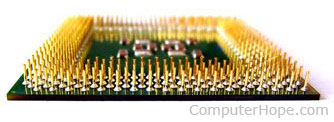What should I consider when upgrading my computer CPU?

Below is a listing of CPU (central processing unit) questions and answers to those questions. These questions are sorted by the number of times they were asked or searched at Computer Hope.
The information on this page applies to desktop computers. For information about upgrading laptops, see: What can I upgrade in a laptop?
Should I upgrade my computer processor?
Today, the processor is one of the last things we'd recommend upgrading in the computer since most motherboards only support so many processors. If you're upgrading because your computer seems slow, we'd recommend upgrading the RAM (random-access memory) and replacing the hard drive with an SSD (solid-state drive) hard drive before upgrading the CPU.
Can I upgrade my computer processor?
Because of the variety of computer motherboards specifications and OEM (original equipment manufacturer) modifications, we do not specify to users if they are capable of upgrading to a higher processor. To obtain this information, contact the computer or motherboard manufacturer or refer to the computer documentation.
When contacting your computer manufacturer concerning a CPU upgrade, ask the questions below.
- What is the maximum speed I can put into my computer?
- Do I need to switch any jumpers or dip switches when adding the new CPU, and if so, which ones?
- Do I need any additional hardware when upgrading the CPU, such as a new heat sink or interposer?
Can I use an AMD CPU with an Intel-based motherboard, or vice versa?
Intel and AMD processors use proprietary chipsets and socket types, and cannot be used together.
For more information, see: Can an AMD and Intel processor work together?
Can I upgrade to a processor utilizing MMX?
If the computer supports modifying the voltage, a computer with non-MMX can be upgraded to a processor with MMX (MultiMedia eXtension). However, because of the variety of possibilities, we recommend contacting the computer or motherboard manufacturer to determine if this is possible.
Unless your computer is more than ten years old the processor is probably already using MMX.
Why do I not notice a difference in speed when upgrading my CPU?
The CPU chip you have installed in the computer determines the speed increase of the computer. For example, if you upgrade from a Core i3 CPU to a Core i5 CPU, you will not notice much speed increase. Even with a Core i7, you will not notice a major change in speed.
When upgrading the CPU, there is not a dramatic speed increase in all programs. However, you should notice a small increase in program load time and performance of a program.
Can I use a Slot A in a Slot 1 or a Slot 1 in a Slot A?
The Slot 1 processors and specification is a registered trademark of Intel, and because of this, AMD could not design a compatible slot. Therefore, AMD created the Slot A that looks similar to Intel's Slot 1, but they are not compatible. Therefore, a Slot 1 processor will not work in a Slot A motherboard, and a Slot A will not work in a Slot 1.
